新概念二1-8课复习提纲
- 格式:doc
- 大小:19.00 KB
- 文档页数:2
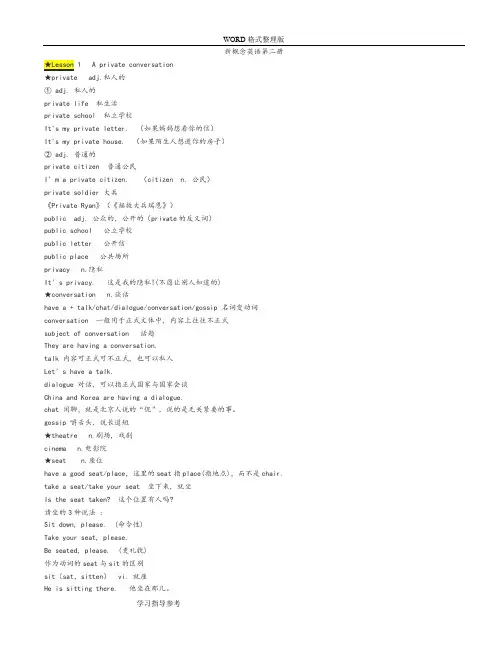
新概念英语第二册★private adj.私人的① adj. 私人的private life 私生活private school 私立学校It's my private letter. (如果妈妈想看你的信)It's my private house. (如果陌生人想进你的房子)② adj. 普通的private citizen 普通公民I’m a private citizen. (citizen n. 公民)private soldier 大兵《Private Ryan》(《拯救大兵瑞恩》)public adj. 公众的,公开的(private的反义词)public school 公立学校public letter 公开信public place 公共场所privacy n.隐私It’s privacy. 这是我的隐私!(不愿让别人知道的)★conversation n.谈话have a + talk/chat/dialogue/conversation/gossip 名词变动词conversation 一般用于正式文体中, 内容上往往不正式subject of conversation 话题They are having a conversation.talk 内容可正式可不正式, 也可以私人Let’s have a talk.dialogue 对话, 可以指正式国家与国家会谈China and Korea are having a dialogue.chat 闲聊,就是北京人说的“侃”,说的是无关紧要的事。
gossip 嚼舌头, 说长道短★theatre n.剧场, 戏剧cinema n.电影院★seat n.座位have a good seat/place,这里的seat指place(指地点),而不是chair. take a seat/take your seat 坐下来, 就坐Is the seat taken? 这个位置有人吗?请坐的3种说法 :Sit down, please. (命令性)Take your seat, please.Be seated, please. (更礼貌)作为动词的seat与sit的区别sit(sat,sitten) vi. 就座He is sitting there. 他坐在那儿。
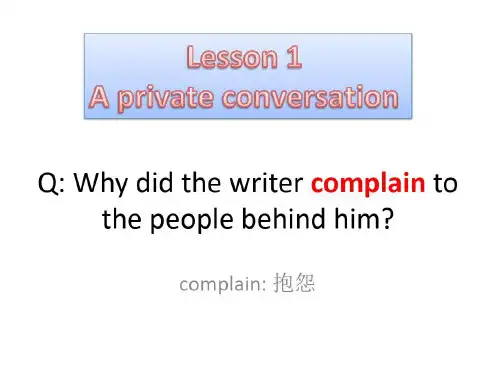
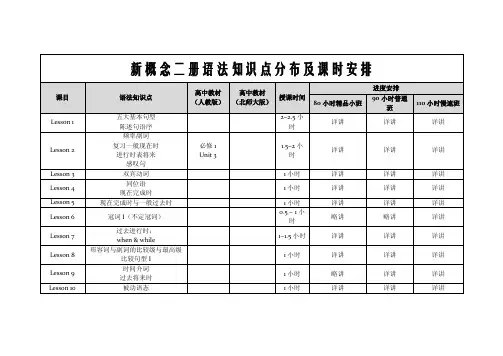
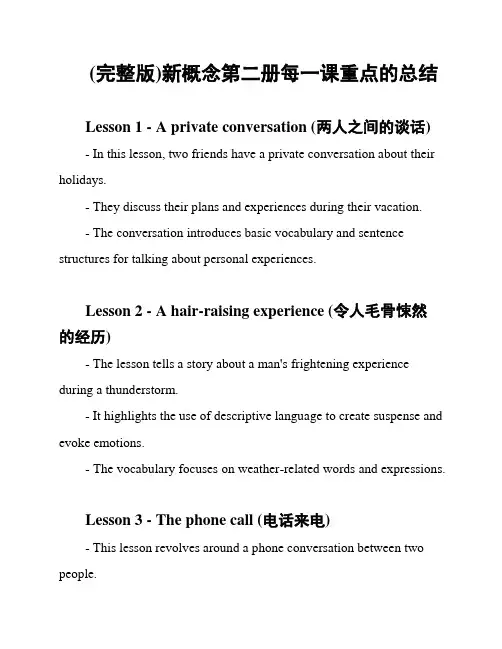
(完整版)新概念第二册每一课重点的总结Lesson 1 - A private conversation (两人之间的谈话)- In this lesson, two friends have a private conversation about their holidays.- They discuss their plans and experiences during their vacation.- The conversation introduces basic vocabulary and sentence structures for talking about personal experiences.Lesson 2 - A hair-raising experience (令人毛骨悚然的经历)- The lesson tells a story about a man's frightening experience during a thunderstorm.- It highlights the use of descriptive language to create suspense and evoke emotions.- The vocabulary focuses on weather-related words and expressions.Lesson 3 - The phone call (电话来电)- This lesson revolves around a phone conversation between two people.- The dialogue also includes expressions for making suggestions and giving advice.Lesson 4 - A famous monastery (一座著名的修道院) - The lesson describes a visit to a famous monastery.- It introduces vocabulary related to religious buildings and their surroundings.- Additionally, it provides practice in forming questions and giving short answers.Lesson 5 - A trip to Australia (澳大利亚之行)- In this lesson, a young girl talks about her trip to Australia.- Vocabulary related to travel, geography, and animals is presented.Lesson 6 - A rainy Saturday (一个雨天的星期六)- The lesson portrays a girl's activities on a rainy Saturday.- It introduces vocabulary relevant to hobbies and leisure activities.- The use of present continuous tense is emphasized to describe ongoing actions.Lesson 7 - Money, money, money! (金钱,金钱,金钱!)- This lesson explores the influence of money on people's lives.- It introduces vocabulary related to finance, business, and personal finances.- The dialogue highlights the use of modal verbs for making suggestions and giving advice.Lesson 8 - Mr. Hiker (远足先生)- The lesson narrates Mr. Hiker's experience hiking in the mountains.- Vocabulary related to nature, camping, and hiking is presented.- The past simple tense is practiced to describe past events.Lesson 9 - No parking (禁止停车)- This lesson focuses on the concept of parking restrictions.- Vocabulary related to road signs, transportation, and rules is introduced.Lesson 10 - Cycling for charity (骑自行车为慈善事业)- The lesson discusses a charity event involving cycling.- Vocabulary related to sports, charity, and participation in events is presented.- The dialogue emphasizes the use of phrasal verbs and expressions related to physical activities.Lesson 11 - Adventure sports (冒险运动)- In this lesson, different adventure sports are introduced and discussed.- Vocabulary related to extreme sports, risk-taking, and outdoor activities is presented.- The lesson also focuses on the use of present perfect tense to describe past experiences.Lesson 12 - Life in a big city (大城市的生活)- The lesson describes the advantages and disadvantages of living in a big city.- It introduces vocabulary related to urban life, city services, and facilities.- The dialogue includes phrases for expressing opinions and preferences.[...continued...]。
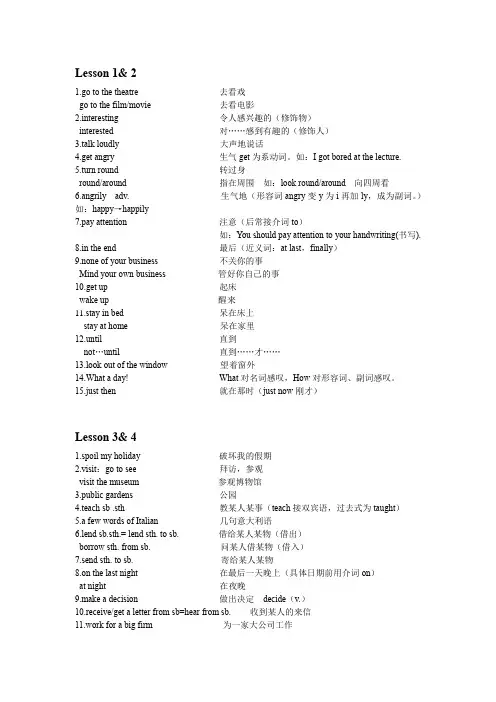
Lesson 1& 21.go to the theatre 去看戏go to the film/movie 去看电影2.interesting 令人感兴趣的(修饰物)interested 对……感到有趣的(修饰人)3.talk loudly 大声地说话4.get angry 生气get为系动词。
如:I got bored at the lecture.5.turn round 转过身round/around 指在周围如:look round/around 向四周看6.angrily adv. 生气地(形容词angry变y为i再加ly,成为副词。
)如:happy→happily7.pay attention 注意(后常接介词to)如:You should pay attention to your handwriting(书写).8.in the end 最后(近义词:at last,finally)9.none of your business 不关你的事Mind your own business 管好你自己的事10.get up 起床wake up 醒来11.stay in bed 呆在床上stay at home 呆在家里12.until 直到not…until 直到……才……13.look out of the window 望着窗外14.What a day! What对名词感叹,How对形容词、副词感叹。
15.just then 就在那时(just now刚才)Lesson 3& 41.spoil my holiday 破坏我的假期2.visit:go to see 拜访,参观visit the museum 参观博物馆3.public gardens 公园4.teach sb .sth 教某人某事(teach接双宾语,过去式为taught)5.a few words of Italian 几句意大利语6.lend sb.sth.= lend sth. to sb. 借给某人某物(借出)borrow sth. from sb. 问某人借某物(借入)7.send sth. to sb. 寄给某人某物8.on the last night 在最后一天晚上(具体日期前用介词on)at night 在夜晚9.make a decision 做出决定decide(v.)10.receive/get a letter from sb=hear from sb. 收到某人的来信11.work for a big firm 为一家大公司工作12.a great number of 许多(后加可数名词)13.has been to spl.(某地) 去了某地已经回来了has gone to spl.(某地) 去了某地还没有回来14.in the centre of... 在......中部15.fly to:go to ...by plane飞往某地16.find this tip exciting 觉得这次旅行激动人心Lesson 5& 61.be five miles from spl.(某地) 离……5英里远2. cover (1)覆盖,经常用作be covered with 由……覆盖(2)+距离,相当于travelWe covered 15 miles yesterday.昨天我们走了15英里。
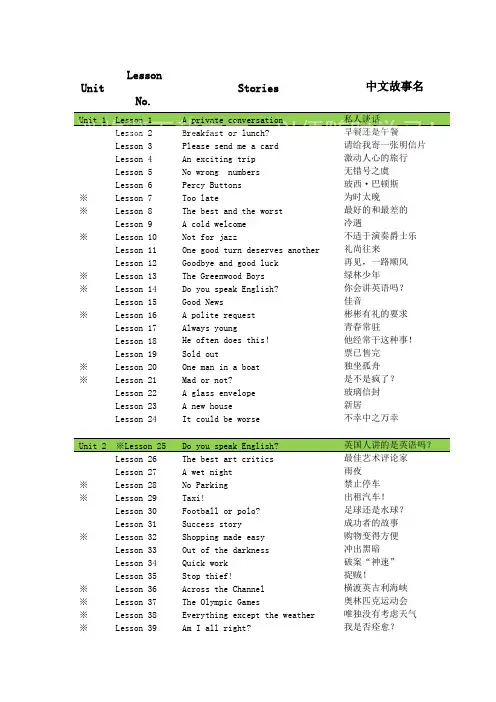
Lesson 81Escape脱逃Lesson 82Monster or fish?是妖还是鱼?※Lesson 83After the elections大选之后Lesson 84On strike罢工※Lesson 85Never too old to learn活到老学到老Lesson 86Out of control失控Lesson 87 A perfect abili 极好的不在犯罪现场的证据Lesson 88Trapped in a mine困在矿井里※Lesson 89 A slip of the tougue口误Lesson 90What's for supper?晚餐吃什么?Lesson 91Three men in a basket三人同篮Lesson 92Asking for trouble自找麻烦※Lesson 93 A noble gift崇高的礼物Lesson 94Future champion未来的冠军Lesson 95 A fantasy纯属虚构※Lesson 96The dead return亡灵返乡At In To With KS9,33,57Lesson 81 KS10,34,58Lesson 82 KS74-82※Lesson 83一般将来时 KS12,36,60Lesson 84一般将来时、将来进行时、将来完成进行时※Lesson 85 KS13,37,61KS14,38,62Lesson 86间接引语 KS15,39,63Lesson 87 IF KS16,40,64Lesson 88 Must Have to,Need,Should KS17,41,65※Lesson 89 Have KS18,42,66Lesson 90 Can,Be able to,Manage to KS19,43,67Lesson 91 KS20,44,68Lesson 92 KS21,45,69※Lesson 93 KS22,46,70Lesson 94 KS60,69Lesson 95!※Lesson 96动词keep的不同含义※Lesson 78动词take的不同含义Lesson 79带on的短语 SD43※Lesson 80易混词汇:cloth clothing clothes Lesson 81 laugh (at)Lesson 82易混词汇:temper mood※Lesson 83语序Lesson 84易混词汇: too enough※Lesson 85 enough fairly Lesson 86!Lesson 87动词run的不同含义Lesson 88易混词汇:free single※Lesson 89用and连接的两个名词以及后面的动词单复形式Lesson 90动词make的含义Lesson 91 So do I Lesson 92重音※Lesson 93!Lesson 94!Lesson 95 SD74-91※Lesson 96工欲善其事必先利其器教材特点:NCE是很好的基础性教材,具备一个完整的英语学习体系,主要包括了听/说/读/写四项基本技能。
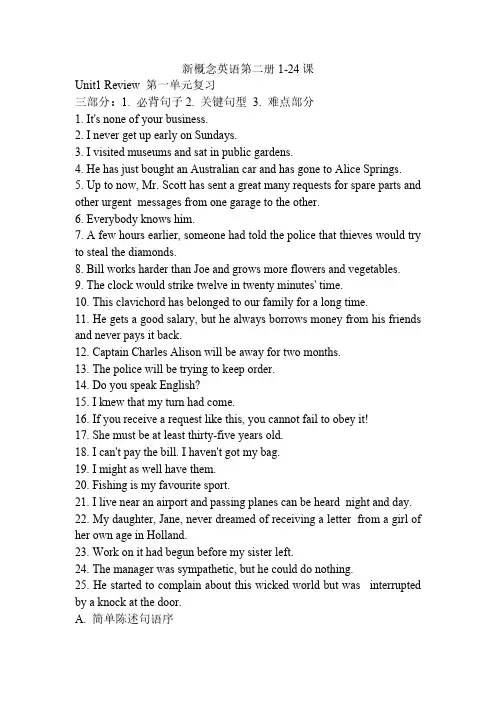
新概念英语第二册1-24课Unit1 Review 第一单元复习三部分:1. 必背句子2. 关键句型 3. 难点部分1. It's none of your business.2. I never get up early on Sundays.3. I visited museums and sat in public gardens.4. He has just bought an Australian car and has gone to Alice Springs.5. Up to now, Mr. Scott has sent a great many requests for spare parts and other urgent messages from one garage to the other.6. Everybody knows him.7. A few hours earlier, someone had told the police that thieves would try to steal the diamonds.8. Bill works harder than Joe and grows more flowers and vegetables.9. The clock would strike twelve in twenty minutes' time.10. This clavichord has belonged to our family for a long time.11. He gets a good salary, but he always borrows money from his friends and never pays it back.12. Captain Charles Alison will be away for two months.13. The police will be trying to keep order.14. Do you speak English?15. I knew that my turn had come.16. If you receive a request like this, you cannot fail to obey it!17. She must be at least thirty-five years old.18. I can't pay the bill. I haven't got my bag.19. I might as well have them.20. Fishing is my favourite sport.21. I live near an airport and passing planes can be heard night and day.22. My daughter, Jane, never dreamed of receiving a letter from a girl of her own age in Holland.23. Work on it had begun before my sister left.24. The manager was sympathetic, but he could do nothing.25. He started to complain about this wicked world but was interrupted by a knock at the door.A. 简单陈述句语序a. 1. I enjoyed the film yesterday.2. My mother went to market.3. (This morning) the children asked questions continuously in class4. (on Sundays) we stay at home (on Sundays).5. (This morning) I borrowed a book from the library (this morning).b. 1. She rarely answers my letters.2. The shops always close on Saturday afternoons.3. We never work after six o'clock.4. We sometimes spend our holidays abroad.5. Do you ever buy CDs?B. 动词a. Now and Alwaysb. What happened?c. What has happened?d. What happened? What has happened?1. What __ you __ (buy) yesterday? [did, buy]2. Up till now, he ___ never __ (lend) me anything. [has, lent]3. __ you __ ( burn) those old papers yet? [Have, burnt]4. He __ (fight) in Flanders in the First World War. [fought]5. We __ just __ (win) the match. [have, won]e. What was happening? What happened?1. As my father __ (leave) the house, the postman __ (arrive).[was leaving / left, arrived]2. Tom __ (work) in the garden while I __ (sit) in the sun.[was working / worked, was sitting / sat]3. As I __ (walk) down the street, I __ (meet) Charlie.[was walking / walked, met]4. While he __ (read) the letter, he __ (hear) a knock at thedoor. [was reading, heard]C. must, have to, can and maymust:必须have to:不得不(客观要求)表达请求或询问时,can / may二者可以互换D. a, the and someE. the best and the worst1. It is the most unusual film I've ever seen.2. Mr. Jones is a better teacher than Mr. Brown.3. This book is more interesting than that one.4. She is the laziest pupil in the class.a. 单音节词,一般直接在词尾加-er,-est.特殊情况:以-e结尾:直接加r / st以-y结尾:变y为i再加er / est以一个元音+ 辅音结尾:双写末尾辅音,再加er / estbigger, strongest, taller, larger, shiest …b. 双音节词,除以-y结尾的双音节形容词,先变y为i再加er和est 外,其他绝大多数双音节词是分别在此前加more和mostc. 多音节词都是分别在前面加more和mostmore interesting, the most successfuld. 不规则词good / well, bad / ill, little, many / much, far, oldF. in, on, atG. 动介搭配1. by the way:顺便问一下on the way:在… 的路上2. borrow from:从… 借来lend sth. to sb.:把… 借给3. ask questions:问问题ask for help:求助4. grow:成长(动作,过程)grow up:成熟,长大5. beside:在… 旁边besides:除此之外6. it's - it is ; it hasits 所有格代词,它的7. yet通常用在疑问句或否定句中,表示“某事预期发生,却还未发生”Is dinner ready yet? I'm starving.still 表示"因某事持续的时间比预期的要久而惊讶的"Is it still raining?8. on one's desk:在某人桌上in one's office:在某人办公室9. it is 指代;形式主语;天气(adj. / v.)there be:有;there be sb. doing sth. ; 天气(n.)10. stay at home:待在家in my house:在我房子里词汇重点讲解一:近义词/ 用法seat n.座位seat / sitvt. 及物动词坐下seat + oneselfseatedThey seated themselves on the grass.他们在草地上坐下Be seated, please.请各位落座吧I found the girl seated in the chair, crying loudly. 我发现小姑娘坐在椅子上大声哭泣sit vi.sit down:坐下stand up:站起来loudly loud / aloud / loudlyloudadj. 声音响亮的His voice is loud.他的声音响亮adv.Can you speak louder, please? (副词比较级)您能再大声一点么aloudadv. 大声地(can be heard 重点在于出声)[formal]正式场合使用He read一般过去时the letter aloud to us. 大声读信She cried aloud in protest. 大声抗议loudly adv. 副词意思和loud作副词时一样,但是搭配位置不同①loud 只能放在动词后面speak / talk / laugh loud②loudly 可以放在动词前后speak / talk / laugh loudlyThe audience laughed loudly at the joke.台上有人讲笑话,下面的人大声笑The cock loudly crows outside my window.公鸡在我窗户外面大声啼鸣。
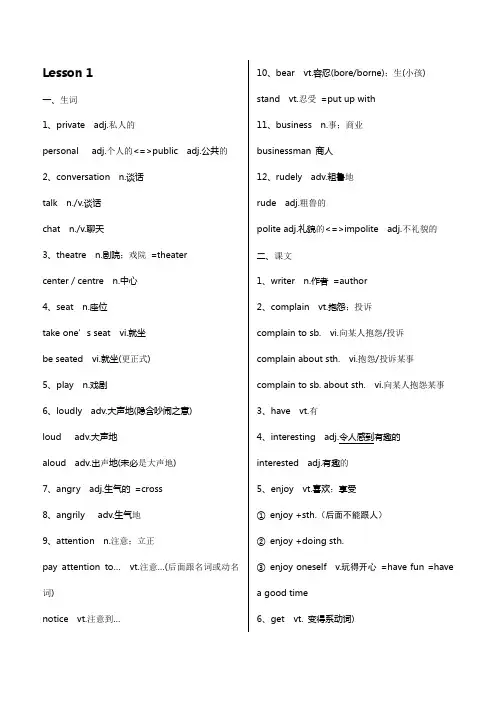
Lesson 1一、生词1、private adj.私人的personal adj.个人的<=>public adj.公共的2、conversation n.谈话talk n./v.谈话chat n./v.聊天3、theatre n.剧院;戏院=theatercenter / centre n.中心4、seat n.座位take one’s seat vi.就坐be seated vi.就坐(更正式)5、play n.戏剧6、loudly adv.大声地(隐含吵闹之意)loud adv.大声地aloud adv.出声地(未必是大声地)7、angry adj.生气的=cross8、angrily adv.生气地9、attention n.注意;立正pay attention to…vt.注意…(后面跟名词或动名词)notice vt.注意到…10、bear vt.容忍(bore/borne);生(小孩)stand vt.忍受=put up with11、business n.事;商业businessman 商人12、rudely adv.粗鲁地rude adj.粗鲁的polite adj.礼貌的<=>impolite adj.不礼貌的二、课文1、writer n.作者=author2、complain vt.抱怨;投诉complain to sb. vi.向某人抱怨/投诉complain about sth. vi.抱怨/投诉某事complain to sb. about sth. vi.向某人抱怨某事3、have vt.有4、interesting adj.令人感到有趣的interested adj.有趣的5、enjoy vt.喜欢;享受①enjoy +sth.(后面不能跟人)②enjoy +doing sth.③enjoy oneself v.玩得开心=have fun =have a good time6、get vt. 变得系动词)7、turn round vi.转身=turn around8、look at…vt.看着9、in the end adv.最后≈at last ≈finally ≈in time ≈eventually10、It’s none of your business.不关你的事.Lesson 2一、单词1、until prep.直到…until和till的区别until多用于较正式场合,可用于句首;till常用于口语中,不可以用于句首。
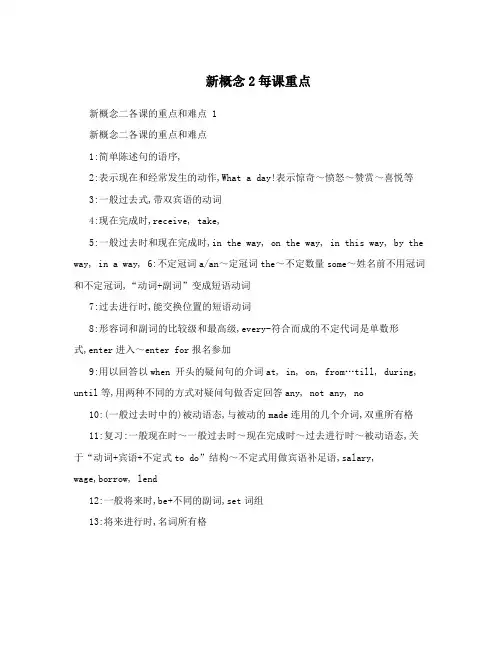
新概念2每课重点新概念二各课的重点和难点 1新概念二各课的重点和难点1:简单陈述句的语序,2:表示现在和经常发生的动作,What a day!表示惊奇~愤怒~赞赏~喜悦等3:一般过去式,带双宾语的动词4:现在完成时,receive, take,5:一般过去时和现在完成时,in the way, on the way, in this way, by the way, in a way, 6:不定冠词a/an~定冠词the~不定数量some~姓名前不用冠词和不定冠词,“动词+副词”变成短语动词7:过去进行时,能交换位置的短语动词8:形容词和副词的比较级和最高级,every-符合而成的不定代词是单数形式,enter进入~enter for报名参加9:用以回答以when 开头的疑问句的介词at, in, on, from…till, during, until等,用两种不同的方式对疑问句做否定回答any, not any, no 10:(一般过去时中的)被动语态,与被动的made连用的几个介词,双重所有格11:复习:一般现在时~一般过去时~现在完成时~过去进行时~被动语态,关于“动词+宾语+不定式to do”结构~不定式用做宾语补足语,salary,wage,borrow, lend12:一般将来时,be+不同的副词,set词组13:将来进行时,名词所有格14:过去完成时,ask, ask for,except, except for, apartfrom,which/either/neither/both of, 15:间接引语,nervous, irritate,office, study, desk,afford16:if引导的真实条件句,polite, police,pay attention to, care, look after, take care of,remind, remember,第二人称you可以表示“任何人”的意思17:情态动词must常用来表示不可逃避的义务,可用have (got) to来代替,as,dress, suit, costume,grow, grow up18:have的用法,give it back, give in, give away, give up,beside, besides 19:Can和May的用法,缩略形式,20:动名词,容易混淆的词:interested, interesting,excited,exciting,it’s, its,realize, understand。
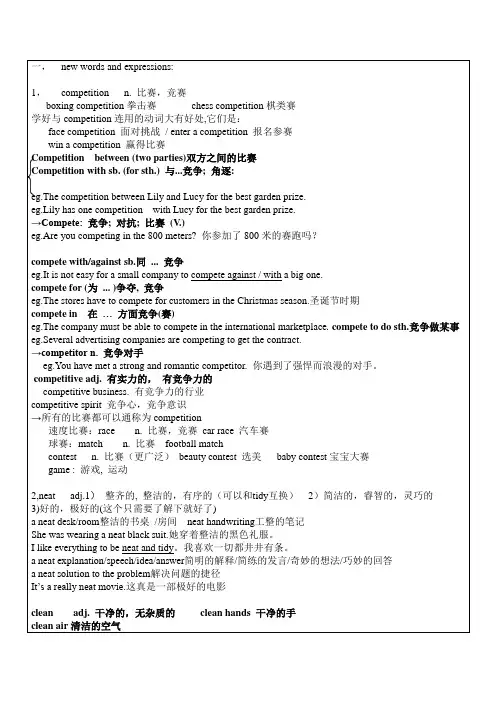
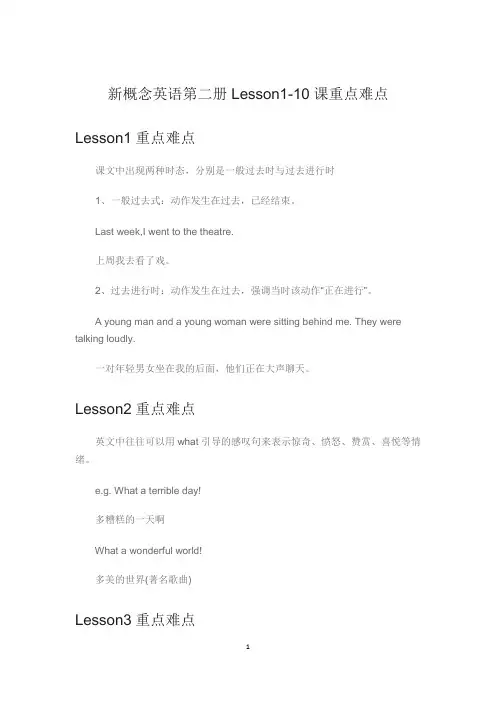
新概念英语第二册Lesson1-10课重点难点Lesson1重点难点课文中出现两种时态,分别是一般过去时与过去进行时1、一般过去式:动作发生在过去,已经结束。
Last week,I went to the theatre.上周我去看了戏。
2、过去进行时:动作发生在过去,强调当时该动作“正在进行”。
A young man and a young woman were sitting behind me. They were talking loudly.一对年轻男女坐在我的后面,他们正在大声聊天。
Lesson2重点难点英文中往往可以用what引导的感叹句来表示惊奇、愤怒、赞赏、喜悦等情绪。
e.g. What a terrible day!多糟糕的一天啊What a wonderful world!多美的世界(著名歌曲)Lesson3重点难点1、用and连接的动作时态必须保持一致。
课文第三句话I visited museums and sat in public gardens 时态都为一般过去时,译为"我参观了博物馆,还去了公园。
"2、英语中的某些动词可以跟两个宾语,称为双宾语结构。
这些词都有“给予”的意思例如He lent me a book 其中a book 为直接宾语me为间接宾语,可改为He lent a book to me 。
这也就意味着,如果直接宾语位置在间接宾语之前,需要用到介词to 或for。
Lesson4重点难点现在完成时的标志词:just: 刚才、仅仅、只是。
already: 早已,已经; 先前。
recently: 最近、近来。
so far: 到目前位置yet: 还、已经since: 从...之后; 从...以来in the past/last years: 在过去的几年中。
Lesson5重点难点1、Up to now, Mr Scott has sent a great many requests for spare parts and other urgent messages from one garage to the other.本句时态为现在完成时,其中up to now为完成时标志,译为“到目前为止”。
新概念英语第二册语法重点(教学大纲)1. **时态变化**:包括一般现在时到一般过去时,现在进行时到过去进行时,一般过去时到过去完成时,现在完成时到过去完成时,以及一般将来时到过去将来时的变化。
2. **时间、地点及指示词的变化**:如here到there,tomorrow到the next day,the following day,this到that等的变化。
3. **人称变化**:根据句意改变人称。
4. **直接宾语/间接宾语**:主语+及物动词+间接宾语+直接宾语。
在这里,直接宾语是及物动词的直接对象,间接宾语是及物动词的动作所涉及的人或事务。
5. **一般现在时**:表示经常发生的动作或情况。
动词第三人称单数形式:在一般现在时中,除了不规则动词,大多数动词的第三人称单数形式是在原形词尾加s。
主语+is/am/are:用于肯定句和否定句,主语是单数时用is,复数时用are。
6. **一般过去时**:表示过去发生的动作或情况。
动词过去式:在一般过去时中,大多数动词的过去式是在原形词尾加ed。
主语+was/were:用于肯定句和否定句,主语是单数时用was,复数时用were。
7. **现在进行时**:表示现在正在进行的动作。
主语+am/is/are+doing:用于肯定句和否定句,主语是单数时用am,复数时用are。
8. **过去进行时**:表示过去正在进行的动作。
主语+was/were+doing:用于肯定句和否定句,主语是单数时用was,复数时用were。
9. **一般将来时**:表示将来发生的动作或情况。
10. **将来进行时**:表示将来某个时刻正在进行的动作。
主语+will be+doing:用于肯定句和否定句,主语是单数时用will be,复数时用will be。
11. **现在完成时**:表示过去发生的动作或情况,并对现在造成影响。
主语+have/has+动词过去分词:用于肯定句和否定句,主语是单数时用has,复数时用have。
复习Lesson1----Lesson8 (Test)一、根据首字母或汉语提示完成句子。
1, He threw all the clothes onto the bed and walked out _________(生气地).2, Because she was not paying a__________, she did not see the hotel in the road ahead and fell in.3, While we were visiting the country, people there were very f_______ to us and helped us a lot.4, I want a _______(单一的)room during the stay in Beijing.5, If Mr. John isn’t in his office, you can leave a _______(口信)6, Some ______(乞丐)always hang around the subway stations.7, I will meet her at the a_______. Her fight is arriving at 3 o’clock.8, As more people are out of work, the ____________ for jobs is very fierce.二、单项填空。
1, China is one of ________ countries in the world.rger B, largest C, the largest D, the larger2, Of all the subjects, physics seems to be _________ for me.A, difficult B, too difficult C, more difficult D, the most difficult 3, I met an old friend of mine while I ________ on the street.A, walks B, walk C, was walking D, am walking4, ---Do you know ___girl who is standing under ____ tree?---- Of course! She is May, my daughter.A, the;the B, a;a C, a;/ D, /;the5, All of us _______ our homework already.A, finished B, have finished C, will finish D, finishes6, ----Linda, I ______ at the airport for an hour. But nobody came to meet me.---Don’t worry. I will go to meet you soon.A, arrived B, will arrive C, have been arrived D, have arrived 7, The boy ____ a wallet on the road when he came back from school.A, find B, finding C, found D, will find8, My brother said he would write to me , but I ______ any letters from him so far.A, won’t receive B, didn’t receive C, hadn’t receive D, haven’t received 三、用所给单词的正确形式填空。
新概念英语二册(Lesson 1-Lesson 8)复习资料一.单词:根据汉语意思写出下列单词。
1.私人的2.谈话3.剧场,戏院4.座位5.戏6.大声地7.生气的 8.注意 9.容忍10.事 11.无礼的,粗鲁的 12.直到13.外面 14.(铃,电话等)响 15.重复16.寄,送 17.友好的 18.使索然无味19.博物馆 20.公共的 21. 服务员22.借给 23.决定 24.整个的25.唯一的,单一的 26.令人兴奋的 27.接受,收到28.商行,公司 29.不同的 30.中心31.在国外 32.鸽子 33.信息34.越过 35.距离 36.要求,请求37.备件 38.业务,服务 39.乞丐40.食物 41.衣服口袋 42.拜访,光顾43.机场 44.期待,等待 45.贵重的46.包裹 47.钻石 48.偷49.主要的 50.飞机场起落的地方 51.警戒,守卫52.珍贵的 53.石子 54.沙子55.比赛,竞赛 56.整齐的,整洁的 57.小路,小径68.木头的二.短语:根据汉语意思写出下列短语。
1.转身2.注意3.最后4.不关你的事5.一个私人谈话6.在…外面7.吃早饭 8.寄给我一张贺卡9.几句意大利语 10.借给我一本书11.几行 12.做重大决定13.一次激动人心的旅行 14.从…到…15.一个大公司 16.许多17.在…的中心 18.飞往…19.敲… 20.向某人索要某物21.在机场 22.南非23.试图干某事 24.把…从…拿下来25.在主楼内 26.海关27.守卫 28.令某人感到惊奇的是29.充满了 30.参加31.最漂亮的 32.最好的花园比赛33.一座木桥三、语法知识单复数形式(如 I am, you are, he has).宾语一般为名词、代词、数词或名词短语。
在主动句中,宾语位于动词之后。
一个句子不总需要有宾语。
状语的位置比较灵活。
当一个句子中有一种以上的副词时,地点副词的一般位置是在方式副词之后、时间副词之前。
新概念二各课的重点和难点1:简单陈述句的语序;2:表示现在和经常发生的动作;What a day!表示惊奇,愤怒,赞赏,喜悦等3:一般过去式;带双宾语的动词4:现在完成时;receive, take;5:一般过去时和现在完成时;in the way, on the way, in this way, by the way, in a way;6:不定冠词a/an,定冠词the,不定数量some,姓名前不用冠词和不定冠词;“动词+副词”变成短语动词7:过去进行时;能交换位置的短语动词8:形容词和副词的比较级和最高级;every-符合而成的不定代词是单数形式;enter进入,enter for报名参加9:用以回答以when 开头的疑问句的介词at, in, on, from…till, during, until等;用两种不同的方式对疑问句做否定回答any, not any, no10:(一般过去时中的)被动语态;与被动的made连用的几个介词;双重所有格—11:复习:一般现在时,一般过去时,现在完成时,过去进行时,被动语态;关于“动词+宾语+不定式to do”结构,不定式用做宾语补足语;salary, wage;borrow, lend12:一般将来时;be+不同的副词;set词组13:将来进行时;名词所有格14:过去完成时;ask, ask for;except, except for, apart from;which/either/neither/both of;15:间接引语;nervous, irritate;office, study, desk;afford16:if引导的真实条件句;polite, police;pay attention to, care, look after, take care of;remind, remember;第二人称you可以表示“任何人”的意思17:情态动词must常用来表示不可逃避的义务;可用have (got) to来代替;as;dress, suit, costume;grow, grow up18:have的用法;give it back, give in, give away, give up;beside, besides19:Can和May的用法;缩略形式;20:动名词;容易混淆的词:interested, interesting;excited, exciting;it’s, its;realize, understand。
新概念2每课重点New Concept 2: Key Points and Difficulties1.The word order of simple declarative sentences;2.XXX。
"What a day!" expressing surprise。
anger。
n。
joy。
etc。
3.Simple past tense。
verbs with double objects;4.Present perfect tense。
receive。
take;5.Simple past tense and present perfect tense。
in the way。
on the way。
in this way。
by the way。
in a way;6.XXX。
definite article the。
indefinite quantity some。
no article before names。
"verb + adverb" es phrasal verb;7.Past continuous tense。
phrasal verbs that XXX;parative and superlative forms of adjectives and adverbs。
indefinite pronouns formed by "every-" are singular。
enter。
enter for;9.ns at。
in。
on。
from。
till。
during。
until used to XXX "when"。
two XXX using any。
not any。
no;10.Passive voice in simple past tense。
ns used with the passive "made"。
1-8课复习提纲
一、单词
私人的private 生气的angry 谈话conversation 生气地angrily 剧院theatre 注意attention 座位seat 容忍bear(bore-borne) 戏play 事business
大声地loudly 粗鲁地rudely 直到until 外面outside 姑,姨,婶aunt (铃,电话)响ring 重复repeat 寄,送send
友好的friendly 明信片postcard 服务员waiter 使索然无味,损坏spoil 借给lend 决定decision 博物馆museum 整个的whole
公共的public 唯一的single 令人兴奋的exciting 不同的different 接受,收到receive 中心centre 商行,公司firm 在国外abroad
鸽子pigeon 要求,请求request 信息message 备件spare part 越过cover 业务,服务service 距离distance 乞丐begger 衣服口袋pocket 食物food 拜访,光顾call 侦探detective 主要的main 机场airport 飞机起落的场地airfield 期待,等待expect
警戒,守卫guard 贵重的valuable 珍贵的precious 包裹parcel 石子stone 钻石diamond 沙子sand 偷steal 比赛competition 木头的wooden 整齐的,整洁的neat 水池pool 小路,小径path
二,短语
享受....enjoy sth 玩的开心enjoy oneself 喜欢做某事enjoy doing sth 有时sometimes 几次some times 某时sometime 一段时间some time 直到。
才。
not...until By train乘火车,介词短语作方式状语take trains动词,作谓语come,go,arrive,leave等瞬间动词的现在进行时表示将来,如:I’m coming to see you. 教某人Teach sb sth=teach sth to sb 把某物借给某人lend sb sth=lend sth to sb 向某人借某物borrow sth from sb 花费(时间,金钱)做某事spend time/money on sth spend time/money (in) doing sth 每天every day 每天的everyday 想think about 做决定make up one’s mind/make a decision 决定去做某事decide to do sth (主观)接受accept (客观)接收,收到receive 许多大量加可数名词复数a great number of/a great many 许多加可数名词或不可数名词a lot of/lots of 曾经去过某地have been to 去了某地have gone to 在。
中部in the centre of 发现某人或某物怎么样find sb/sth+adj/doing/done another/one,,,the other.../some...others.../some...the others...区别到目前为止up to now 离。
多远be...(away)from... 以这种方式in this way 挡道,妨碍in the way 在某种意义上in a way 在去。
的路上on the way to 在回家的路上on the way home 顺便问一下by the way 敲向某人请求某物作为对。
的报答倒立告诉某人某事拜访搬到。
敲门要某物向某人要某物call的用法:1,叫喊2,请某人call the doctor3,打电话call me at 654321 4,光顾某地call at+某地5,拜访某人call on sb 一个月几次once/twice/three times a month 作为对。
的回报in return for.... 倒立stand on one’s head 复合不定代词(everybody,nobody,something)谓语动词用单数而且修饰这些词的定语要后置在机场at the airport 在机场跑道at the air field 整整一上午all morning 整整一天all day 整年all year 一整天the whole day while当。
时候,引导过去进行时从句,必须是延续性动词keep guard守望,警戒令某人吃惊的是to one’s surprise 充满。
be full of a few/few/a little/little区别steal sth/rob sb of sth区别Each/every区别报名参加enter for 进入。
enter Beat/win区别努力工作work hard 艰难的工作hard work
三,翻译句子
1,不关你的事
2,这是一个私人间的谈话
3,有时我要一直躺倒吃午饭的时候
4,正在这时,电话铃响了
5,我这就来看你
6,明信片总是搅得我假日不得安宁
7,一位友好的服务员教了我几句意大利语
8,我读了几行,但一个字也不懂
9,到了最后一天,我做出了一项重大决定
10,我在房间里关了整整一天,然而竟然连一张明信片也没写成。
11,我刚刚收到弟弟蒂姆的来信
12,他在一家大公司工作并且已经去过澳大利亚的不少地方了
13,我弟弟从来没出过国,所以他觉得这次旅行非常激动人心
14,平赫斯特离锡尔伯里只有五英里
15,这只鸟只用了三分钟就飞完了全程
16,就这样他开始了自己的私人电话业务
17,他问我要了一顿饭和一杯啤酒,作为回报,那乞丐头顶地倒立起来,嘴里还唱着歌。
18,他每月对这条街上的每户人家光顾一次,总是请求给他一顿饭和一杯啤酒。
19,数小时以前,有人向警方报告,说有人企图偷走这些钻石。
20,令他们吃惊的是,那珍贵的包裹里面装的全是石头和沙子
21,每年的花园竞赛我也参加,但总因是镇上最劣的花园而获得一个小奖
四,重点语法
1,一般过去时
2,一般现在时
3,现在进行时
4,感叹句
5,接双宾语的动词give send lend take bring show teach
6,现在完成时
7,冠词的用法
8,过去进行时
9,形容词比较级和最高级。